Here's How to Meal Prep Like a Pro
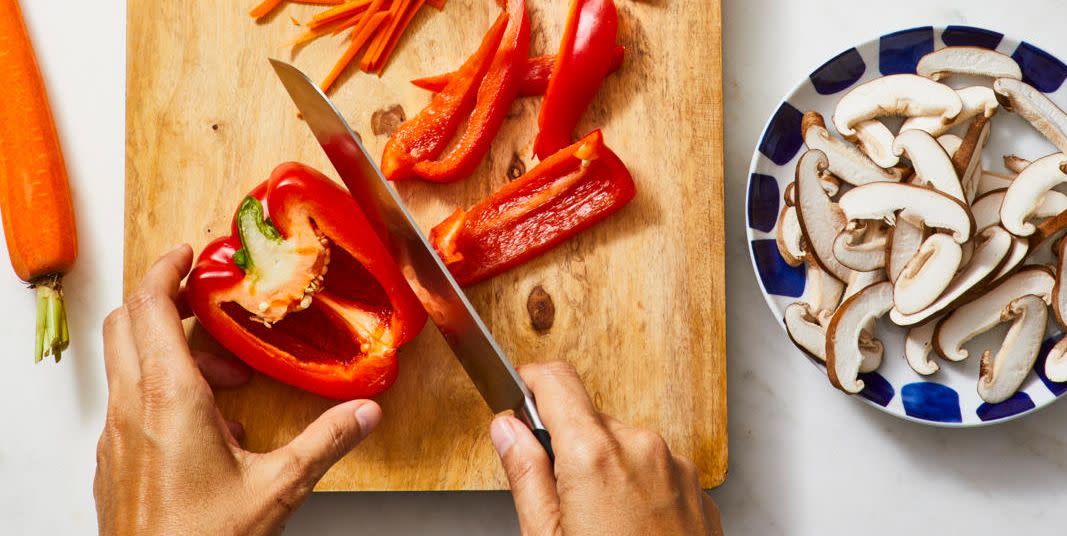
"Hearst Magazines and Yahoo may earn commission or revenue on some items through these links."
Meal prep is the practice of preparing the key elements of a dish (think: grains, roasted veggies, cooked protein, etc.) or even the entire recipe before you plan to eat it. This smart meal planning method gives you a head start on the week, often leading to faster, healthier, stress-free eating. Learning how to meal prep will seriously change your weeknight dinner game, since it can save you a lot of time in those precious (sometimes hectic!) post-work hours and ensure that you’re getting a nutritious option on the table in no time. Let’s dive in, shall we?
How do I prep my meals for the week?
There are a few different ways to meal prep, but basically, all the food preparation methods involve organizing the food in your fridge in a way that makes for easy, make-ahead meals or easier breakfasts, lunches and dinners — whether that's just chopping or slicing foods or actually cooking it. There's no one way to do it, but three common techniques include:
What are the benefits of meal prepping?
Meal prepping can save you time on busy weeknights (and money on your grocery bill!) by prepping food on the weekends and minimizing waste. It's also easier to eat healthy meals since the menu gets set in advance. You're less likely to choose a not-so-great option when you already have a healthy dinner at home, ready to go.
Is there any downside to meal prepping?
Since meal prepping can involve eating the same dish or types of food a few days in a row, it's not for people who prize variety and freshness above all else. Getting kids on board with eating "leftovers" can also pose a challenge, especially if you're making accommodations for different dietary restrictions or palettes. To avoid monotony, use different spices, dressings or condiments in your dishes or freeze some of your prepped food to feature in meals for a future week.
Okay! I am ready — how do I start meal prepping?
Stock up on reusable, airtight food storage containers that will help your prepared ingredients or meals stay fresh by locking bacteria and odors out.
Once you have your meal-prepping gear, you may want to download a meal prep app that will help keep your plan organized and make shopping and cooking a snap by curating recipes and grocery lists for you. Don't fret if you're not into the tech-based solution: A pen and paper also work for planning out your week.
All set? The next step is picking your recipes. Before you do, consider these four things:
Choose just one mealtime you'd like to prepare for — either quick breakfasts, lunches or healthy dinners. Keep it simple by starting with one you usually eat out or skip altogether.
Pick a day to do your meal prepping. Sunday and Wednesday are two common choices.
Determine how much you want to prep. Experiment with prepping for two or three days before attempting five. You may not like eating the same thing the whole week.
Invest in a cookbook. Good Housekeeping's Easy Meal Prep: The Ultimate Playbook for Make-Ahead Meals comes with over 100 healthy make-ahead recipes, as well as tips and techniques to make meal prepping a breeze.
Pick up a meal prep planner. Our Weekly Meal Prep Planner includes tear-off grocery lists and 52 weeks of meal prep inspo and organizational tools.
If you're looking to ramp up your nutrient intake, make veggies or fruit at least 50% of whatever you’re prepping. They don't necessarily have to come from the actual produce section: Frozen or canned varieties will last almost forever and work in nearly every meal.
The best foods for meal prepping:
Frozen vegetables: Freezer finds are already washed, chopped and ready to be roasted, steamed or sautéed.
Starchy vegetables: Potatoes and other root vegetables are healthy, filling, and will last longer in your fridge than more delicate cooked veggies.
Stiff fresh vegetables: Celery, carrots, bell peppers, radish and other crunchy veggies make delicious meal-prep snacks on their own or dipped in hummus.
Sturdy greens: Hearty leaves like spinach and kale will last longer in your fridge than softer lettuces. Keep them washed and dried but wait to dress them until just before serving.
Whole grains: Oats, quinoa, barley and buckwheat are tasty for breakfast, lunch or dinner.
Pulses: Chickpeas, lentils, beans and peas add fast, plant-based protein to any meal.
Lean protein: For vegetarian protein, stock up on eggs, unsweetened Greek yogurt, skyr, reduced-sodium cottage cheese or tofu. Fish and meat eaters can source frozen or canned seafood, lean cuts of chicken, turkey, beef and pork.
Whole fruits: Depending on what's in season near you, look for apples, bananas, oranges, clementines, plums, peaches, pears, berries and more.
Nuts and seeds: Almonds, walnuts, peanuts, pumpkin seeds, chia seeds and flax seeds not only add a burst of nutrients, but also a delightful crunch.
Save this trusty shopping list for your next trip to the grocery store:
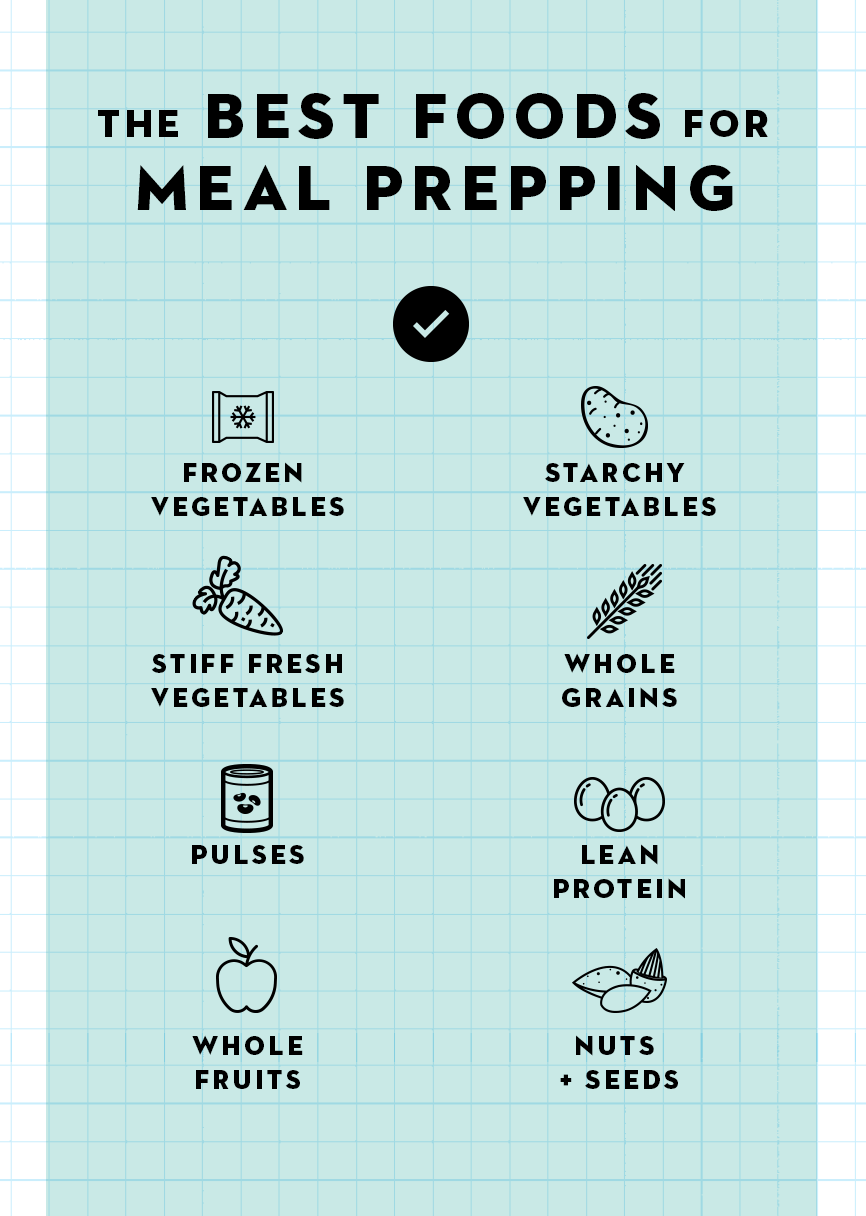
Need help with recipe inspiration? We've got you covered:
Best meal prep recipes for breakfast:
Breakfast is the most important meal of the day, so it's a good one to pick when you're choosing which meals to prep. You want to make sure your meal is light, but also has good carbs, fiber and protein.
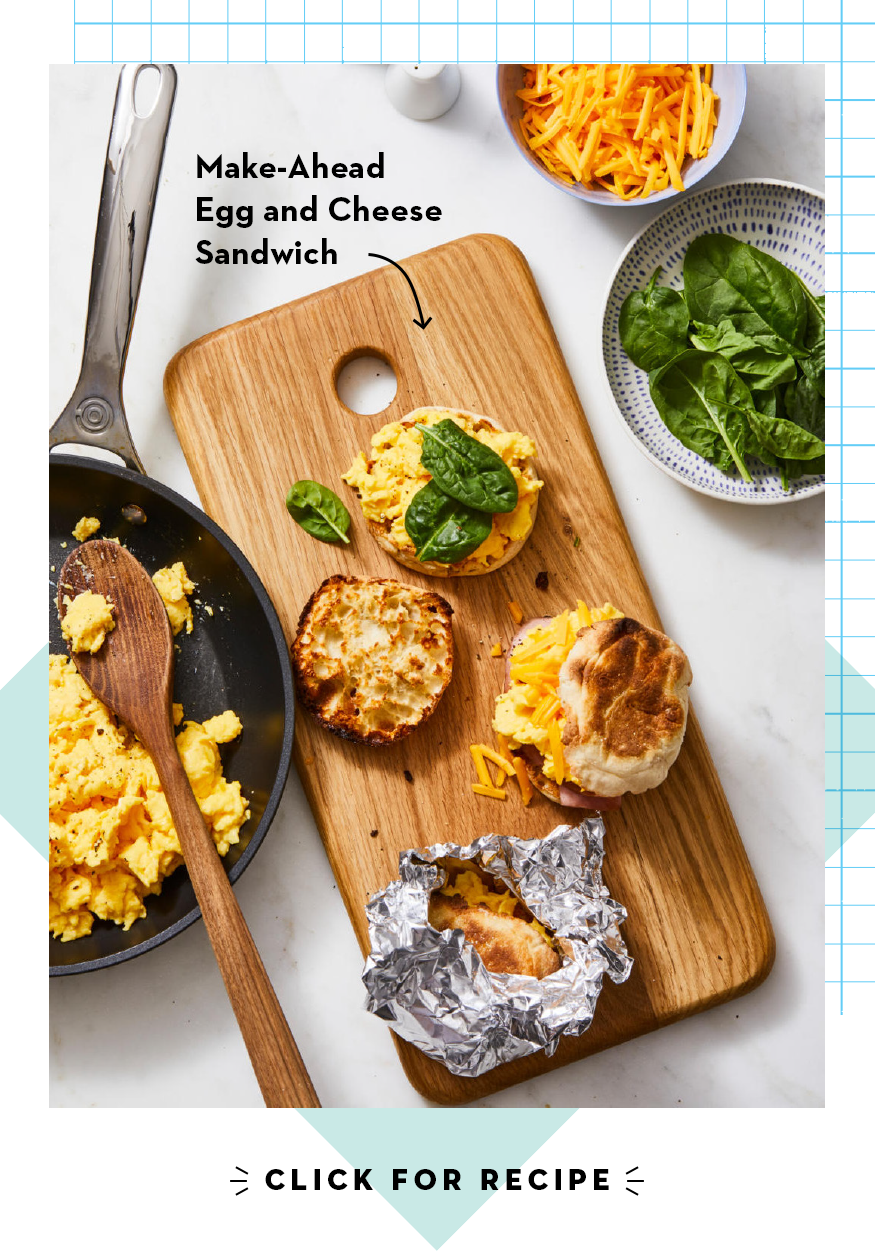
Best meal prep recipes for lunch:
Salads and soups are anything but boring when you take the time to customize them to your liking. Regardless of what you pick, focus on lean protein, healthy carbs and veggies.

Best meal prep recipes for dinner:
Add lots of color to your plate by loading up on all sorts of vegetables, including broccoli, peppers and tomatoes, but go lighter on the carbs and grains.
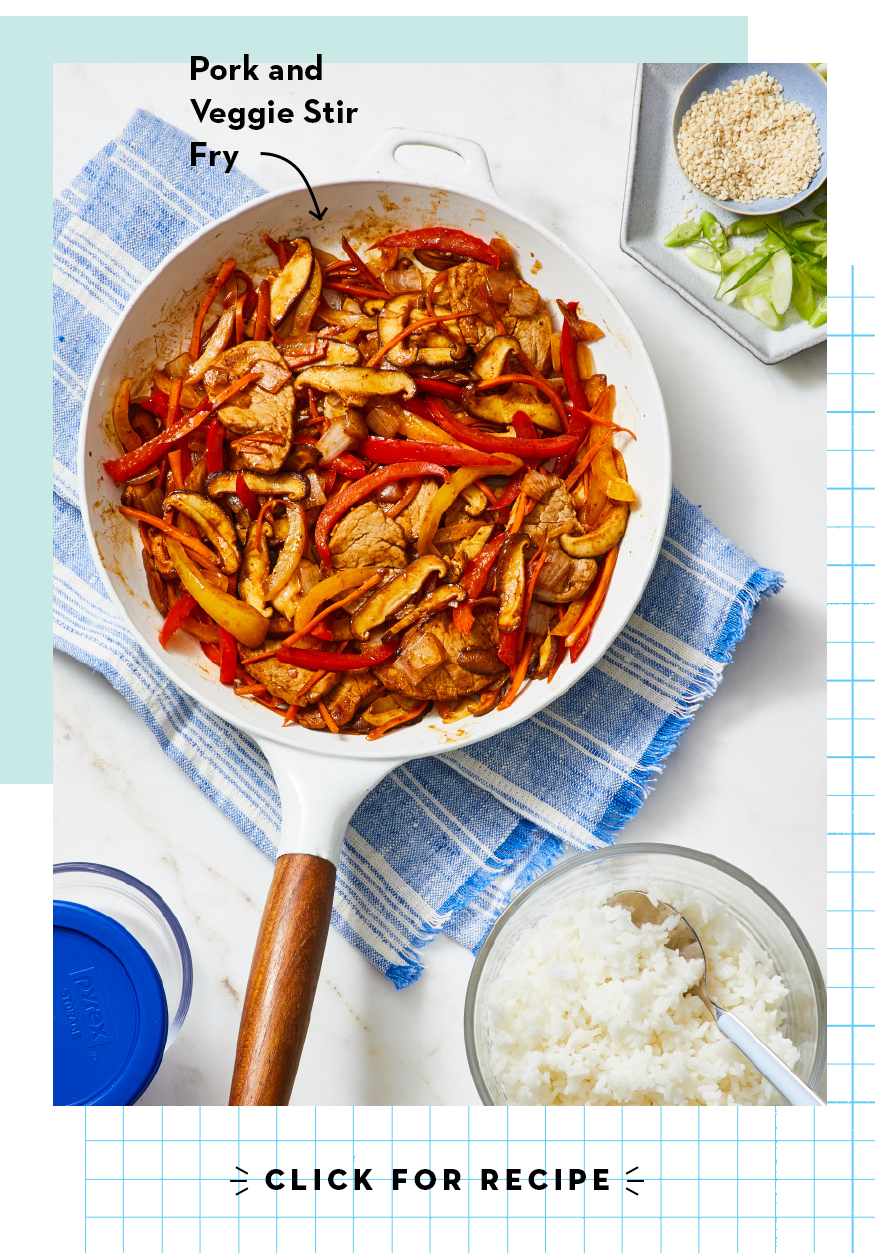
Best meal prep recipes for snacks:
Put a healthy spin on your childhood favorites when the afternoon slump hits. Trade peanut butter for almond butter and cheesy popcorn for sweet matcha.
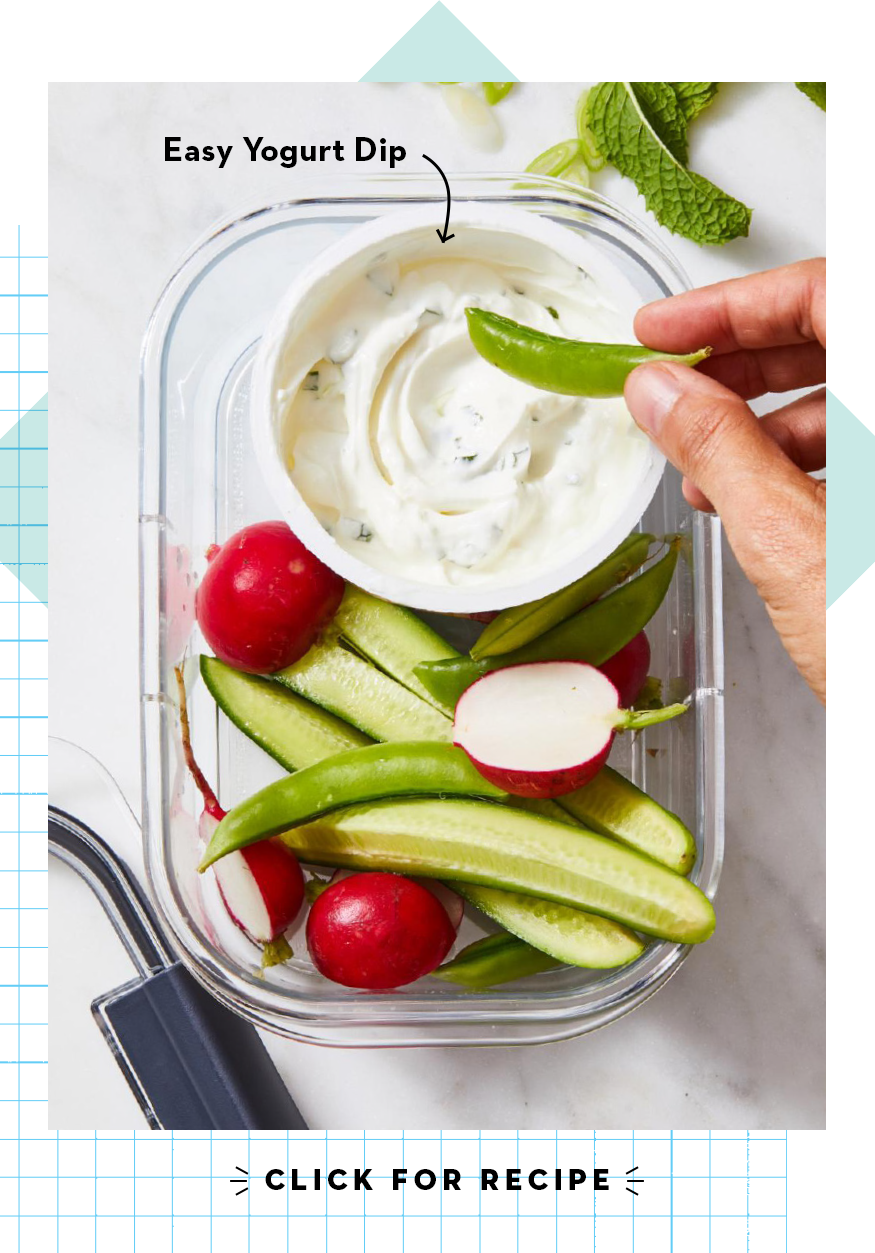
How long will meal prepped food last?
Prepared foods can remain refrigerated for 2–5 days or frozen for 3–4 months, depending on the ingredients. To play it safe and avoid foodborne illness, keep food out of the "danger zone" — temperatures between 40°F and 140°F. Sealing food in airtight packaging or storage containers will not only keep bacteria out, but also protect the flavor, lock moisture in and help prevent freezer burn.
You Might Also Like
